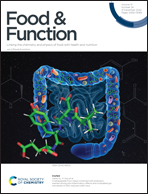Dietary methionine restriction improves gut microbiota composition and prevents cognitive impairment in d-galactose-induced aging mice†
Abstract
Dietary methionine restriction (MR) has been shown to delay aging and ameliorate age-related cognitive impairments. We hypothesized that changes in the gut microbiota may mediate these effects. To test this hypothesis, ICR mice subcutaneously injected with 150 mg kg−1 day−1D-galactose were fed a normal (0.86% methionine) or an MR (0.17% methionine) diet for 2 months. Multiple behavioral experiments were performed, and the gut microbiota composition, metabolite profiles related to short-chain fatty acids (SCFAs) in the feces, and indicators related to the redox and inflammatory states in the hippocampus were further analyzed. Our results indicated that MR alleviated cognitive impairment (including non-spatial memory deficits, working memory deficits, and hippocampus-dependent spatial memory deficits) and anxiety-like behavior in D-Gal-induced aging mice. Furthermore, MR increased the abundance of putative SCFA-producing bacteria such as Lachnospiraceae, Turicibacter, Roseburia, Ruminococcaceae_UCG-014, Intestinimonas, Rikenellaceae, Tyzzerella, and H2S-producing bacteria such as Desulfovibrio in feces. Moreover, MR reversed and normalized the levels of intestinal SCFAs (acetate, propionate, and butyrate) and important intermediate metabolites of the SCFAs (pyruvate, lactate, malate, fumarate, and succinate), abolished aging-induced oxidative stress and inflammatory responses, increased the levels of H2S in the plasma and hippocampus, and selectively modulated the expression of multiple learning- and memory-related genes in the hippocampus. These findings suggest that MR improved the gut microbiota composition and SCFA production and alleviated oxidative stress and inflammatory responses in the hippocampus, which might prevent cognitive impairment in D-galactose-induced aging mice.



 Please wait while we load your content...
Please wait while we load your content...